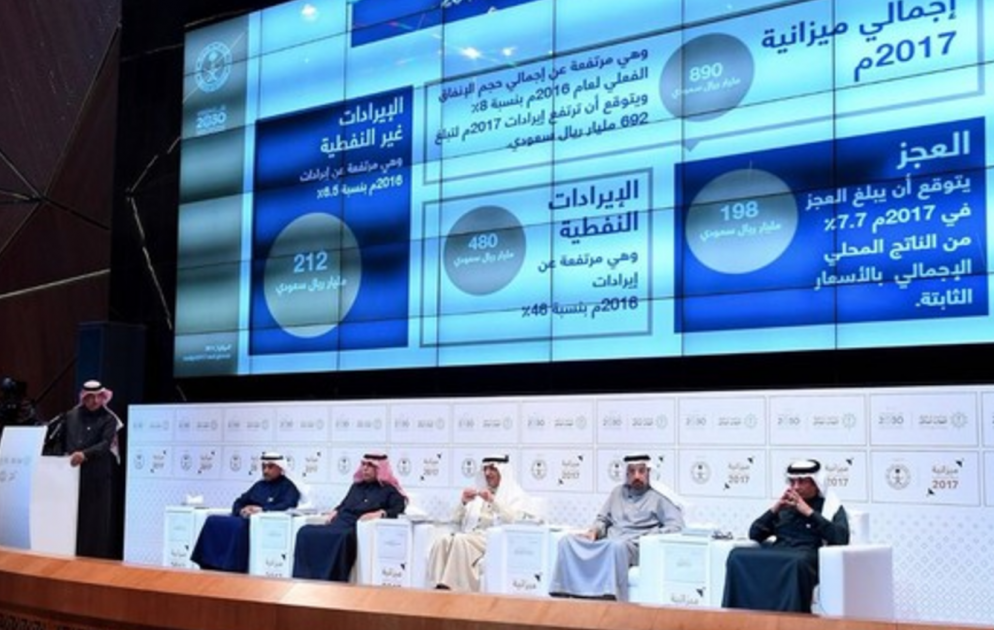
Saudi budget signals economic recovery, say economists
Saudi Arabia’s 2017 budget and spending boost announced Thursday suggests its finances are on the road to recovery, economists said, although one forecast that austerity measures would return.
The oil price crash plunged the Kingdom’s budget into the red, recording a severe deficit of SR366 billion in 2015.
But Thursday’s budget statement suggested that situation is easing and that the deficit is “now manageable.”
Despite plans to increase spending next year, the deficit is forecast to be SR198 billion in 2017, down one third from this year’s figure.
John Sfakianakis, the director of economic research at the Gulf Research Center, based in Riyadh, said that the Kingdom’s aim to eliminate the deficit altogether by 2020 looks achievable.
“It’s a very productive growth and pro-market budget that is setting the fiscal consolidation on a very viable path of achieving its 2020 balanced target,” Sfakianakis told Arab News.
“The 2017 expenditure will help build further confidence and will help bring private investment.”
Economist Nasser Saidi said that the Kingdom’s plan to reform energy prices was driving the plan to increase spending next year.
“The increase in projected revenues and expenditure is primarily due to the energy pricing reform program as well as higher international oil prices, although this will be partially offset by the targeted allowances for those citizens who need government support,” said Saidi, a former Lebanese economic minister and former chief economist at the Dubai International Financial Center.
Saidi, who is now president of advisory Nasser Saidi & Associates, said that the greater transparency reflected in the budget was a good sign ahead of the planned initial public offering (IPO) of state oil giant Saudi Aramco.
“Importantly, the budget reflects greater transparency and disclosure by the government which will be a positive signal to investors, both local and international. This should be seen as part of a strategy of greater transparency in the preparation for the Aramco IPO,” he said. “The Saudi authorities should be commended for the greater openness and desire for accountability, as this will encourage business to engage with government.”
Saidi said that the increased expenditure forecast for this year suggests a departure from previous austerity budgets.
“This should also act as a signal to other GCC countries to taper their fiscal consolidation and turn mode to encouraging growth,” he said.
But Jason Tuvey, Middle East economist at Capital Economics, said in a research note that he expects further austerity measures in 2018.
“While austerity seems to have been put on the back-burner next year, it is likely to resume from 2018,” wrote Tuvey.
“The government repeated its desire to balance the budget by 2020, one of the key targets outlined in the Vision 2030 and National Transformation Plan. Achieving this will require fiscal policy to be tightened further, albeit modestly compared with 2015-16. A value-added tax is scheduled to be introduced next year and we suspect that the government will keep a tight rein on spending.”
Tuvey pointed out that the budget was based on a relatively conservative oil price.
“The government isn’t easing the pace of austerity due to hopes for higher oil prices following the recent OPEC deal to cut output. Indeed, the budget has been based on a conservative oil price of just over $50 (per barrel), slightly below current prices of around $55,” he wrote.
“Instead, the easing of austerity reflects the progress made with fiscal consolidation over the past couple of years. Public spending has been cut by a cumulative 25 percent over the past two years and the non-oil budget balance has improved … The public finances haven’t improved on this scale since the early 1990s, following the end of the Gulf War.”
Tuvey’s overall view was that the budget was a positive sign for Saudi Arabia’s finances next year.
“Saudi Arabia’s budget suggests that, following a significant improvement in the public finances over the past couple of years, the fiscal stance will be broadly neutral in 2017. This supports our view that the economy should embark on a gradual recovery next year,” he wrote.

























